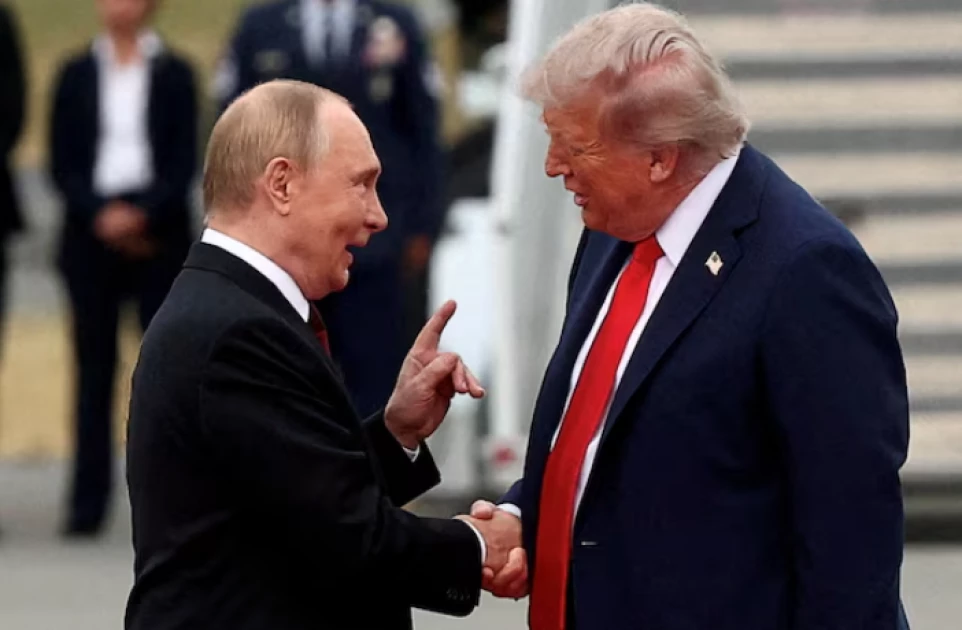With flattery and warnings, Russia tries to revive 'spirit of Alaska' with US

U.S. President Donald Trump shakes hand with Russian President Vladimir Putin, as they meet to negotiate for an end to the war in Ukraine, at Joint Base Elmendorf-Richardson in Anchorage, Alaska, U.S., August 15, 2025. REUTERS/Kevin Lamarque/File Photo

Audio By Vocalize
Two months after a
smiling Donald Trump and Vladimir Putin shook hands at a
military base in Alaska in what looked like the start of a U.S.-Russia
rapprochement, a top Russian diplomat has raised doubts that the "spirit
of Alaska" is still alive.
For Russia, the
Anchorage summit on August 15 had two primary goals: to persuade President
Trump to lean on Ukraine and Europe to agree to a peace settlement
favourable to Moscow, and to encourage a rapprochement in U.S.-Russia ties.
Russian Deputy
Foreign Minister Sergei Ryabkov said this week there had been scant
progress on either front and "powerful momentum" had been lost.
Moscow had signalled it was ready to rebuild ties but Washington had not
reciprocated, he said.
"We have a
certain edifice of relations that has cracked and is collapsing," Ryabkov
said. "Now the cracks have reached the foundation."
After Ryabkov spoke,
a Kremlin aide and Putin's spokesman underlined that contacts with
Washington continue, and the Russian leader sounded more optimistic than
Ryabkov when asked about Ukraine and ties with the U.S. on Friday.
"These are
complex issues that require further study. But we remain on the basis of the
discussion that took place in Anchorage," Putin told a press conference.
His aide later told
the Kommersant newspaper that Russia had agreed to unspecified concessions or
reciprocal steps at the Alaska summit it would be ready to make if Trump got
certain things from Ukraine and the Europeans.
Such a contrast in
tone among senior officials is rare in Moscow and highlights the delicacy and
sensitivity of the twin-track approach Russia is taking - combining flattery
and warnings to adapt to diplomatic reversals since the summit.
While a Trump
initiative has raised hopes of peace in Gaza, he is frustrated by his
failure to broker an end to fighting in Ukraine and has soured, at least
publicly, on Russia.
There is no new
Trump-Putin meeting on the agenda, no date has been set for the next talks on
improving ties, and Washington, without an ambassador in Moscow since June, has
not sought Russia's approval to send a successor.
Trump has spoken of
possibly supplying Tomahawk cruise missiles to Ukraine, hitting a nerve with
Putin, who said it would destroy what is left of U.S.-Russia ties.
Trump has also said
he wants Putin and Ukrainian President Volodymyr Zelenskiy to hold direct
talks, but there appears no near-term prospect of that happening as the tempo
of the war increases.
In a rhetorical
U-turn, Trump has suggested Ukraine could win back all its lost territory,
while dismissing Russia as "a paper tiger," a snipe shrugged off by
Moscow.
In response, Russia
has tried playing good cop, bad cop - with officials at times appearing to
threaten tough responses to U.S. action and at others underlining shared
values.
Putin offered to
voluntarily maintain limits on deployed strategic nuclear weapons set out in
the last arms control treaty with the U.S. once it expires next year if
Washington does the same.
Trump said "it
sounds like a good idea," but there has been no formal U.S. response.
At a foreign policy
conference this month, Putin praised Trump's efforts to broker peace in Ukraine
and made a series of U.S.-focused statements likely to appeal to him.
Putin praised
Michael Gloss, the son of a CIA official killed in Ukraine fighting on Russia's
side, saying he represented "the core of the MAGA movement, which supports
President Trump."
He also condemned
the murder of Trump ally Charlie Kirk , saying Kirk had defended the
"traditional values" which he said Gloss and Russian soldiers in
Ukraine were giving their lives to defend.
Kirill Dmitriev,
head of Russia's sovereign wealth fund and Putin's special envoy, often
underlines shared views and values with Trump to try to warm up ties - at times
denigrating Trump's opponents and praising his special envoy, Steve Witkoff.
Kremlin aide Yuri
Ushakov went so far as to say Russia would back Trump's candidacy for the Nobel
Peace Prize.
But warnings have
continued, and pushback against Trump's talk of supplying Tomahawk missiles to
Ukraine was immediate.
Putin said such a
step would require the direct involvement of U.S. military personnel, destroy
bilateral relations and usher in a new stage of escalation.
Andrei Kartapolov,
who heads Russian parliament's defence committee, said Moscow would shoot down
Tomahawk missiles and bomb their launch sites if the U.S. supplied them, and
find a way to retaliate against Washington that hurts.
In other terse
comments, Ryabkov said Russia would quickly carry out a nuclear test if the
U.S. did the same, and that Moscow would "get by" if Washington did
not take up Putin's nuclear arms control offer.
Ryabkov also backed
off a Russian offer to discuss the fate of U.S. nuclear fuel at a nuclear plant
Moscow controls in southern Ukraine, and spoke of how Russia was withdrawing
from an agreement with the U.S. to destroy weapons-grade plutonium.
"After the
summit in Alaska, there was hope that Trump was ready to continue dialogue with
Russia and take our interests into account," wrote Andrei Baranov, a
commentator for pro-Kremlin newspaper Komsomolskaya Pravda.
"Donald has now
thoroughly disappointed us with his trademark inconsistency."


Leave a Comment